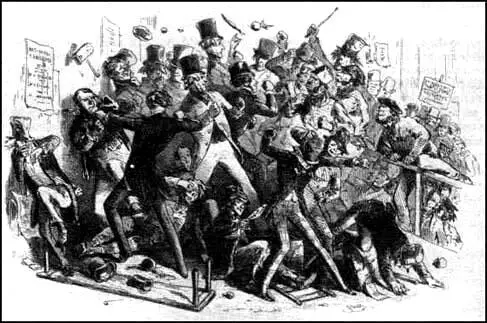George Binns
George Binns, the son of a draper, was born in Sunderland on 6th December, 1815. George's parents were Quakers and he was educated at Ackworth School in Yorkshire. After serving his apprenticeship at his father's shop he worked in a drapers in Wakefield.
In 1837 both of his parents died and George Binns returned to Sunderland to take over the family's draper shop. By this time Binns had developed radical political views and with the help of his friend, James Williams, he established a Mechanics' Institute where local people could read newspapers such as The Poor Man's Guardian, The Gauntlet and The Northern Star.
For a while the two men shared the role of librarian at the Mechanics' Institute but in October they set up business as Booksellers, Stationers and Newspaper Agents at 9 Bridge Street, Sunderland. The shop sold books and newspapers and also served as a meeting place for Radicals in the town. Binns and Williams formed the Sunderland Democratic Association and the men worked closely with other Chartist organizations in the North East of England.

George Binns said at a meeting in Sunderland: "Eighteen hundred years ago the simple and sublime doctrine of equality was preached and taught and acted upon, but that doctrine has long been lost sight of, and now we see nothing but unchristian selfishness. The tyrants might boast of numbers and energy. The tyrants might array their cruelty, but the people will oppose with bravery. We are bound together with no selfish tie, they might boast of their Wellingtons, but we have a God."
Binns was a supporter of William Lovett and the Moral Force Chartists. In April 1839 Binns wrote an angry letter to the Sunderland Herald after it suggested that he had made a speech in favour of Feargus O'Connor and the Physical Force Chartists. The Sunderland magistrates were unconvinced and on 22nd July 1839, Binns and Williams were arrested and charged with attending illegal meetings and publishing a seditious handbill.
At their trial in July, 1840, both men were found guilty of attending an illegal meeting and were sentenced to six months imprisonment in Durham Gaol. George Binns and James Williams were released in January 1841. Chartists in the North East met the men at the gates of the prison and after a public meeting in Durham the men marched back to Sunderland.
After his release from Durham Gaol, Binns returned to his drapery business. He continued to speak and work for universal suffrage and in 1841 was nominated as the Chartist parliamentary candidate for Sunderland. The Liberal candidate was Viscount Howick, the son of Earl Grey, the man responsible for the 1832 Reform Act. Afraid of splitting the vote of the reformers, Binns withdrew. Binns contributed to Viscount Howick's victory by announcing that the Tory candidate had offered him a £125 bribe to stand in the election.
George Binns's drapery business was not successful and in May 1842 he was arrested and sent to Durham Gaol after being able to pay his debts. After his release from prison Binns decided to emigrate to New Zealand. On 1st August, 1842 he sailed from Gravesend and arrived at Nelson, New Zealand, on 14th December, 1842. In New Zealand George Binns worked as an accountant (1844), clerk (1845), and baker (1846-47). George Binns died of consumption on 5th April, 1847.
Primary Sources
(1) Robert Gammage, History of the Chartist Movement (1894)
George Binns possessed a clear and masterly intellect. Without exaggeration he was what may be styled a handsome man. As a speaker he was a free, lucid, fluent, elegant, and florid. Scarcely past his minority, there was an unmistakable ingenuousness in all he uttered; no studying how to accommodate smooth set phrases to his audiences, but a strong sense of right and duty pervading every sentence, and breathing in every world.
The parents of Binns were members of the Society of Friends, who are often very good people in their peculiar way, but careful and assiduous in using every effort for repressions of the passions. Of course, as Quakers, they held the principles of the peace society, but all their care and attention failed to fashion their son to the cold and passionless maxims of their order. Being engaged in the business of drapery, they initiated him into the mysteries of the shop, but not even the minute and petty calculation of profits could crush the soul of George Binns. So unsuited was his father's business to his tastes and inclinations, that he had scarcely attained his majority when he left it and joined James Williams in the most congenial trade of printing and bookselling.
(2) George Binns, speech, Sunderland (27th June, 1838)
Eighteen hundred years ago the simple and sublime doctrine of equality was preached and taught and acted upon, but that doctrine has long been lost sight of, and now we see nothing but unchristian selfishness. The tyrants might boast of numbers and energy. The tyrants might array their cruelty, but the people will oppose with bravery. We are bound together with no selfish tie, they might boast of their Wellingtons, but we have a God.

